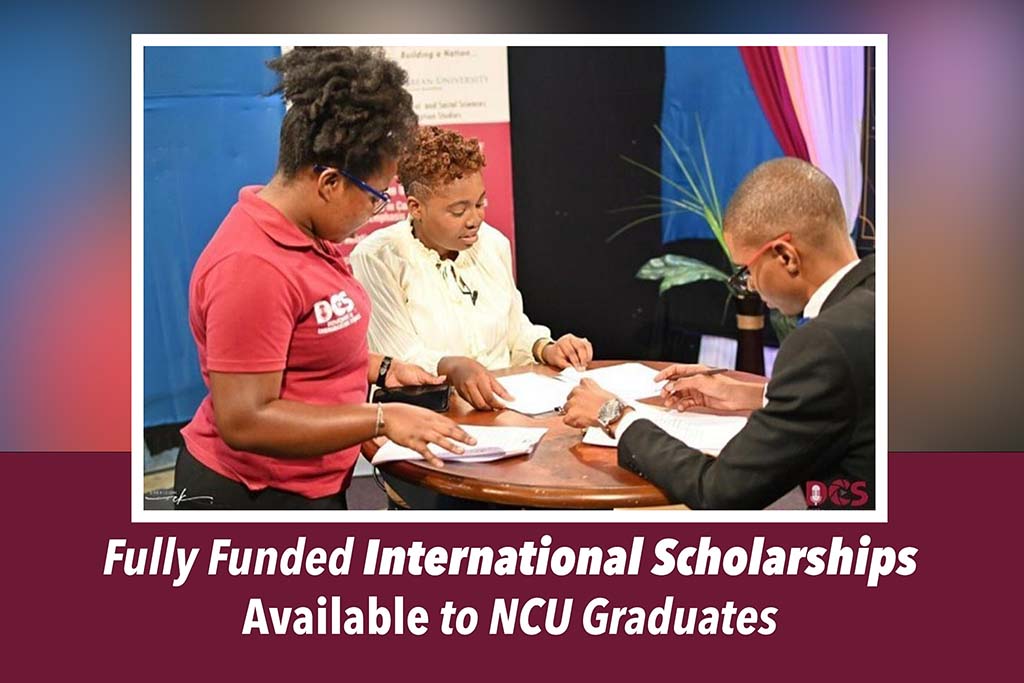In a bid to provide more options for postgraduate study, Northern Caribbean University (NCU) is inviting its graduates to take advantage of educational scholarship opportunities available in Canada, Germany, and Japan.
On April 4, at the annual Global Connections forum, hosted by the Department of Communication Studies (DCS), speakers from around the globe were invited to share scholarship, internship, and job opportunities available. The event was part of their Week of Excellence activities, under the theme ‘Resilient Communication- Paving the Way to Recovery.’
NCU’s Director of Corporate Relations and Strategic Partnerships, Nadeen Campbell, said the school is working hard with local and national foundations to solicit support and solidify relationships to help students.
“We are seeking to benefit NCU in the ways that students don’t have to be able to find the money themselves [to study abroad], and we’re trying to find the money for you,” she said, while speaking at the forum.
Campbell’s presentation highlighted opportunities available in Canada under the Emerging Leaders in the Americas Program (ELAP). According to EduCanada, ELAP was created to strengthen relationships between post-secondary institutions in Canada and Latin America and the Caribbean.
“[Students can take this opportunity] to study for a semester, or to do internships or to do their practicum,” she said.
While Campbell implored interested parties to browse the country and find institutions suitable for their interest—there are a few institutions NCU already maintains a relationship with. Those include Brandon University in Manitoba, Brock University in Ontario and Memorial University of Newfoundland.
“We will work with you to secure your application … the entire Canadian academic system is available to you at the tertiary level,” she said.
Campbell said the University is also in talks with Burman University, which is also owned and operated by the Seventh Day Adventist Church.
For graduates pursuing their Masters or PhD degrees, ELAP will provide $8,200 CAD to those who are planning to be at a Canadian tertiary school for a minimum of four months or one semester.
Depending on the intensity of the research project some students will do, there is also an $11,100 CAD scholarship available for those intending to be there for five to six months, according to Campbell.
“It covers [everything],” she said. “You don’t pay any tuition, it covers your accommodations, your meals, your airfare, other incidentals and all of the things that will be relevant to you in the space that you are going to be in.”
The ELAP application deadline for the academic year 2022 to 2023 closed on March 22.Successful candidates will be contacted in May.
Kaoru Kajigayama, a cultural officer at the Embassy of Japan, said the Japanese Ministry of Education, Culture, Sports, Science and Technology (MEXT) scholarship is available to students wishing to study at the graduate level.
“Most Jamaicans [who’ve studied in Japan] enter the fields of engineering, political science, and animation to name a few,” she said.
While there are no limits to which program you study, she said it must be related to your undergraduate degree and you must be able to do the research at Japanese universities.
Applicants are also required to study Japanese for the first six months in order to successfully pursue their studies.
For students enrolled in a Master’s program, a monthly stipend of $144,000 Yen, or $178,571.21 JMD, is provided. For doctoral courses, an additional $1,000 Yen is given.
“Travel expenses to and from Japan [are included and students are exempt] from school fees for entrance examination, matriculation, and tuition,” she said. The application period usually opens in April and closes in May. The entire entry process, from the moment the application is submitted to acceptance notification, takes approximately one year, Kajigayama said.
For students interested in pursuing studies in Germany, options are also provided at minimal cost.
“Germany usually has no tuition fees for universities, so education is mostly free,” said Sara Azadan, head of public relations at the Embassy of Germany in Kingston, during her presentation.
She said there is usually a contribution each semester ranging from $250 to $350 Euro, which is about $59,000 JMD. This goes towards administrative costs, student dining and sports and cultural events.
Opportunities are available to reduce this cost, courtesy of the German Academic Exchange Service (DAAD), an independent organization of German schools of higher education.
According to the DAAD Scholarship Guide 2021, applicants must have completed their bachelor’s degree in the last six years and possess at least two years of work experience.
Germany has over 2,000 international degree programs where the “language of instruction is generally English”, according to Azadan. A visa is required to study in Germany and work opportunities are available upon graduation.
“You have 18 months that you are allowed to…stay [in] Germany to find a job and then if you do, you may stay,” Azadan said as she ended her presentation.
The next staging of the DCS Global Connections forum will happen in April 2023.



No responses yet